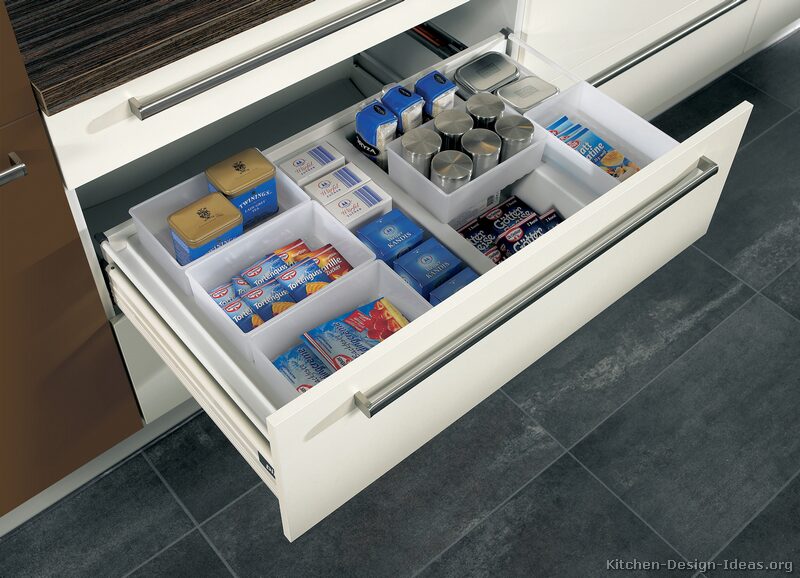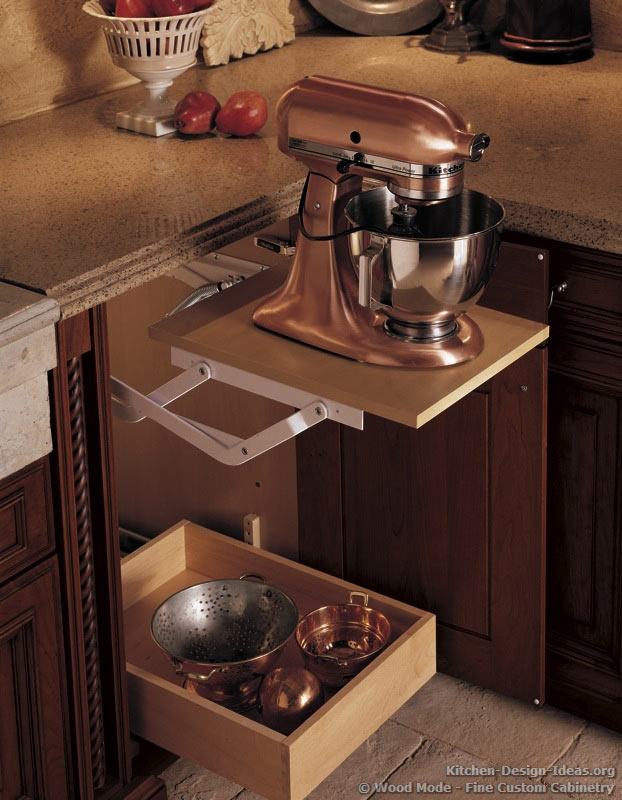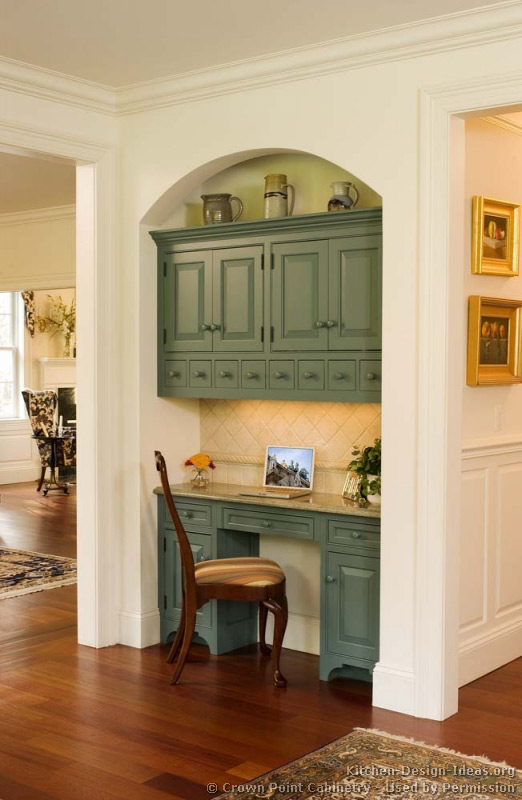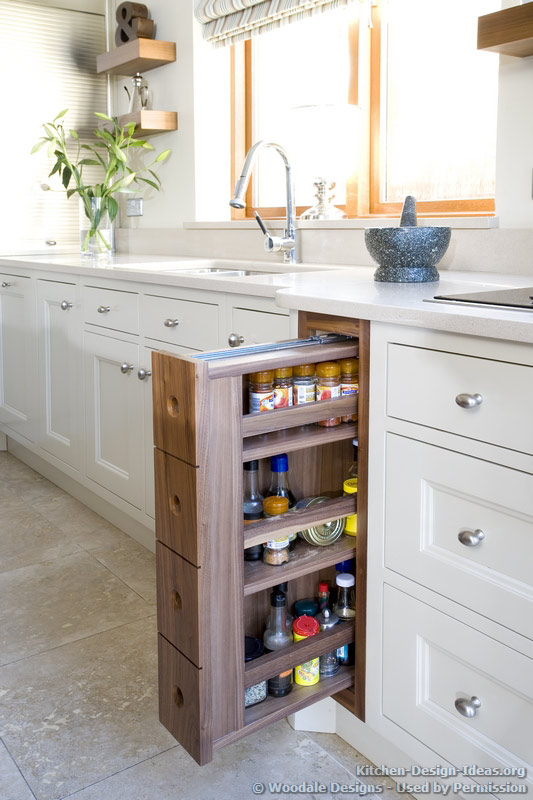How to Organize a Kitchen
10 Tips and Ideas
Learning how to organize a kitchen not only ensures that your kitchen is consistently neat and tidy, but also helps to streamline kitchen activities. Regardless of whether you have just moved into a new house or want to improve the functionality of your current kitchen, we believe these tips will help.

One of the most popular ways to organize a kitchen is to start with a good drawer divider system. See more of this ALNO kitchen here.
1. Dispose of Clutter: Donate or discard anything that you are no
longer using in the kitchen. You can hand it down to a relative, donate
it to charity, or sell it on eBay or
at a yard sale. While some of the cookware in your
kitchen may have some sort of sentimental value to you, be sure to weigh how much you use it versus how much space it consumes. For example, when did you last use the cookie
press? Is the melon baller gathering dust? Do you use all the gizmos in your kitchen? Getting rid of
kitchenware that you no longer use will create space for the
items you really use. If you want great de-cluttering ideas and inspiration, read Clutter's Last Stand by Don Aslett.
2. Go Shopping: If there
is broken kitchenware, replace it with cookware that is functioning. For
example, if the fry pan keeps scorching your delicate dishes, replace
it with a non-stick fry pan. If you do not have the money to replace the
kitchenware, include it in your birthday or anniversary request list.
3. Sort Smarter:
Keep utensils that are frequently used in an area that can easily be
reached. For instance, you can have a cupboard for keeping utensils that
are rarely used and shelves for keeping cookware that is frequently
utilized. Then again, if you lack enough room in your kitchen to build
shelves and cabinets, rarely used items can be kept in an protective container in the garage.
4. Create Work Zones: Consider various centers of activities and keep related cookware close to one another. If you happen to be remodeling, consider building a pantry near the refrigerator to consolidate your food zones, adding a preparation area where meals are prepared before cooking, and a cooking area where the stove is to be placed with appropriate spices and utensils close by. Other zones to consider are a cleaning and waste disposal area as well as a baking and serving area. Creating these activity zones will streamline operations in your kitchen. Check out Blum Dynamic Space for more suggestions on ideal work zones, which are introduced in the video below:
Beyond the Work Triangle: After studying the workflow of kitchen users worldwide, Blum has developed a planning guide called DYNAMIC SPACE which aims to make kitchen tasks more comfortable, less time-consuming, and more ergonomic. The core of their solution begins with planning the kitchen in five zones: Consumables, Non-Consumables, Cleaning, Preparation, and Cooking.
5. Clear the Countertops: The kitchen counter is your main
workspace. Do not forget to clean it in addition to removing clutter
from it. How often do you use the appliances currently taking up space
on the countertop? Is the mixer, toaster oven, rice cooker, or juicer
collecting dust? If you any of your countertop appliances infrequently,
consider storing them in a nearby cabinet instead to be pulled out when
needed.

Save counter space by storing your stand mixer in a base cabinet. This one is built onto a mechanized cabinet lift for frequent access.
6. Organize Shopping Lists: For couples and
families, keeping a consistent place for a shopping list is very
helpful, so that anyone can mark the things that you do not have in your
kitchen. Also, maintaining a separate list of supplies you like to
store your kitchen will help you in ensuring that your kitchen is always
stocked. Maintaining this supply list aids you in buying what is
necessary for your kitchen, thus avoiding impulse buying.
7. Setup a Workstation:
Do you use your kitchen when sending mail or helping your kids with
homework? Do you find yourself reading the morning newspaper in the
kitchen? If you find yourself using the kitchen for other activities
besides cooking, make sure that there is a tidy location within your
kitchen where you can sit and read a book or help your child with their
homework. See this gallery of Kitchen Desks on Pinterest for more inspiration.

An increasing number of families now use the kitchen for everyday tasks, from checking email to doing homework. If you plan to have a desk in your kitchen, be sure to keep it tidy. See more pictures of this kitchen.
8. Get a Tune Up: Your kitchen will not be at
its optimum if there are broken or damaged components, such as
leaking faucets or partially clogged drains. If something is broken in
your kitchen, make a point of replacing or fixing it as soon as
possible.
9. Sort by Frequency of Use: Ideally, an
efficient kitchen basically boils down to having what you need at your
fingertips. If there are items that you use on a frequent basis, you can
keep them close to the area where they are most used, while lesser-used
items should be placed in harder-to-reach areas.
10. Keep Tidy Habits:
Finally, do not forget to clean the kitchen as you work. Once you are
through with a pan, have it cleaned and stored away. This is the most
productive habit to maintain. Cleaning as you work ensures that clutter
does not pile up to unmanageable sizes in the kitchen.
For more inspiration, browse our Kitchen Organizing gallery on Pinterest for a variety of other organizing ideas including specialized drawer storage, bread bins, canisters, spice rack pull-outs, jars, and containers. Have any ideas you'd like to share? Leave a comment for us below.




